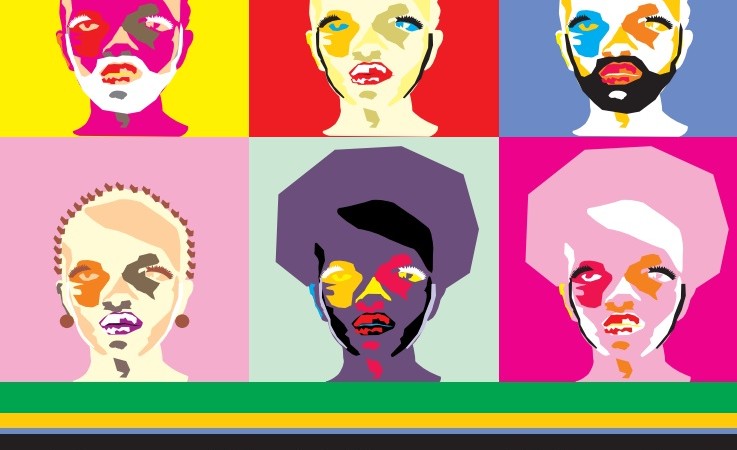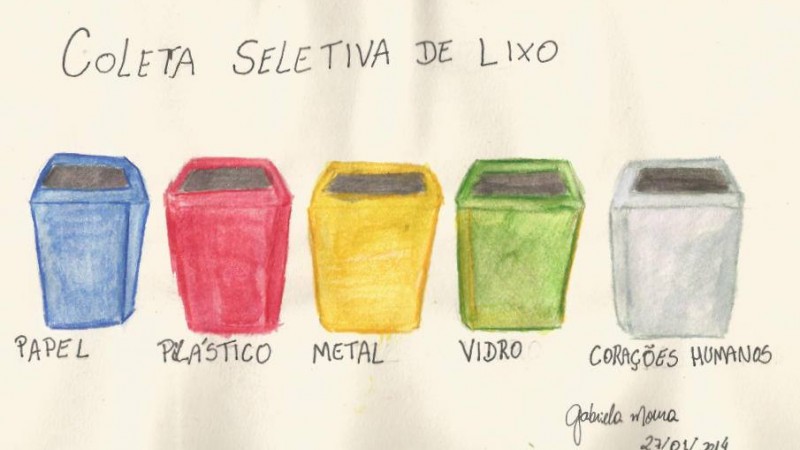
Cover by Alexsandro de Brito Almeida for the report about the first year of the Afroatitude program. Reproduced with permission.
It could be said that Gabriela Moura, at the age of 27, has overcome a great deal in her life. Originally from the suburbs and a pupil at poor state schools in the north of Parana state in Brazil, she nursed a desire, which she has called ‘extremely daring’, to get into the public relations course at Londrina State University. This is no straightforward dream in a place like Brazil, where the children of seamstresses, maids and nannies, like herself, generally don’t aspire to getting any further than middle school.
“Me, Ex-Quota Girl, ‘Daring Bum’” is an intimate and moving post on Gabriela's blog in which she recounted the saga she went through to pass the university entrance exam at 17, and then how she subsequently had to face the prejudice and racism aimed at a student who had passed by means of the ‘racial quotas system’ for further education. Moreover, Gabriela talks about her first contact with black culture, something which has changed her life forever, empowering her to also change the life of all other black youngsters she meets.
The system of racial quotas in Brazil began in 2000 and was validated by the Supreme Federal Tribune in 2012. It aims to reserve places in state and private institutions for specific groups, such as blacks and native Indians, as a way of using affirmative action to reverse historical racism against those of certain ethnic backgrounds. Racial identity in Brazil is a complex subject closely linked to economic and social status, and racism a sore topic among Brazilians – please see our past coverage, linked below, for some more views on this.

Gabriela Moura, 7 March 2014. Published with permission.
Read below extracts from Moura’s blog about her experience, which has caught the eye of the Brazilian blogosphere. It begins with her self-taught preparation for the university entrance exam:
Quando eu tinha 16 anos eu decidi mudar de período na escola, indo do matutino ao noturno, para que assim tivesse um tempo para trabalhar e pagar o cursinho pré-vestibular. E isso já era uma audácia muito grande: desejar ingressar na Universidade Estadual de Londrina. A minha mãe não deixou que eu seguisse com estes planos, dizia que seria pesado demais conciliar trabalho e escola, e me sobraria pouco ou quase nenhum tempo livre pra diversão e coisas de adolescente. Por isso eu comecei a tentar estudar em casa mesmo, só com os materiais da escola – internet era um luxo inimaginável. Na verdade, nem computador eu tinha, e não tinha vaga ideia de quando eu teria um. A minha mãe trabalhava como costureira autônoma.
When I was 16 years old I decided to change my study time at school, from the mornings to the evenings, so I could have time to work and pay for a pre-university entrance exam course. And this was very daring indeed for someone like myself: wanting to get into Londrina State University. My mum wouldn’t let me go ahead with these plans, saying it would be too hard for me to work and study at the same time, and there wouldn’t be enough time for fun and teenage stuff. So I started to try to study at home, just with my school books, as having access to the Internet would have been an unimaginable luxury. Actually I didn’t even have a computer or the slightest idea of when I would ever have one, for my mum was a seamstress after all.
Here she is talking about passing the university entrance exam and the prejudice within the university:
Para encurtar esta parte da história: Em fevereiro de 2005 eu fui a uma festa promovida pela rádio pop local, que divulgaria o resultado do vestibular ao vivo, e quando eles distribuíram o jornalzinho do resultado (patrocinado pelo maior colégio particular da cidade, risos), meu nome estava lá, e naturalmente minha mãe chorou quando recebeu a notícia por telefone, um celular que eu peguei emprestado de um amigo.
Estaria tudo ok se não fosse um porém: eu era cotista. Isso aí é como se eu carregasse alguma placa em neon piscante dizendo que eu não pertencia àquele lugar. Desde o começo eu ouvi manifestações hostis de pessoas que diziam abertamente que eu não deveria estar ali, pelos seguintes motivos:
– Elas estudaram muito, pagaram 2, 3, 4 anos do cursinho mais caro da cidade justamente para terem mais chance.
– Um possível mau desempenho meu atrasaria a turma toda.
– É racismo inverso contra brancos (sic).
– Cria vagabundos.
To summarise this part of the story: in February 2005 I went to a party promoted by the local radio station, which would announce the university exam results live, and when they gave out the little result sheet (sponsored by the biggest private school in the city, LOL), there was my name. And of course my mum cried when I gave her the news on the phone, with a mobile I borrowed from a friend.
It would all have been all right if there wasn’t a big but: I was a quota girl. And that was like carrying a flashing neon sign saying I didn’t belong in that place. Right from the beginning I heard nasty remarks from people who would openly say that I shouldn’t be there, for the following reasons:
– They had studied and paid for 2, 3 and 4 years of the most expensive university preparation courses in town so they would have more likelihood of getting in.
– If I were to do badly my poor performance would hold the whole class up.
– It’s reverse racism against whites.
– It creates a generation of bums.
She talked about the reality of the poor quota student:
Sobre o racismo inverso a gente finge que não ouviu, pro bem da nossa saúde mental. E se insistirem, uma aula explicando o massacre das populações negras deveria ser suficiente. Se não for, é porque o ouvinte é mau-caráter, mesmo. E também me surgia a dúvida: a pessoa estuda 4 anos em escola particular e culpa uma cotista de ter roubado a vaga? Não soa razoável. Mas dinheiro ainda importava.
Ai vem a nova parte da minha novela.
Sobre a vagabundagem cotista: possivelmente a acusação mais esdrúxula neste mar de chorume racista. O curso de Relações Públicas não é dos mais caros. Os livros saem por cerca de 40 reais. A exceção são os livros de Economia e Marketing que, às vezes, passam dos 100. Mas todo aquele volume de xérox começou a falir a conta bancária que eu já não tinha. E, em certos dias, eu precisava escolher entre pagar 3 reais de passagem de ônibus ou usar estes mesmos 3 reais para comprar comida. Dentro do ambiente acadêmico, porém, o desempenho era equivalente. Eu não sentia que era menos capaz do que meus colegas oriundos de escolas particulares.
We would pretend we didn’t hear the comments about reverse racism, to keep our sanity. And if they went on, a lesson describing the massacre of black people was enough to shut them up. And if it wasn’t, then it showed that person wasn’t worth bothering about anyway. And another thing struck me: someone studies for four years at a private school and then blames the quota student for stealing their place at university? That doesn’t seem reasonable. But money did seem to matter to them.
And then a new part in my soap opera.
On the subject of quota students being bums: this is perhaps the most bizarre accusation in this sea of racist rubbish. I had to try really hard to keep going on the course. The public relations course is not the most expensive of all and the books cost around R$ 40 [£12] each, with the exception of the specialist books in economy and marketing, which are around R$ 100 [£30]. But all my photocopying of the books was sending me seriously into the red. And there were days when I had to choose between paying R$ 3 [£1] for the bus fare or buying something to eat. In the academic world, however, the performance was the same. I didn’t feel I was any less able than my classmates from private schools.
On the subject of Afroatitude, a project which brings together quota students from ten state universities:
Com este projeto eu entrei em contato com a cultura negra, o que me era inédito, usei o dinheiro da bolsa pra comprar o primeiro computador da minha vida, estudei a vulnerabilidade da população negra e isso serviu de estopim pra tudo o que eu sou hoje. Apoiados pela Secretaria dos Direitos Humanos do Governo Federal, nós tivemos a chance de estudar a influência e as carências das populações negras das regiões em que vivíamos, e pudemos finalmente ter a noção do tanto de trabalho que ainda havia a ser feito. Eu não sei se consigo ser objetiva neste ponto e explicar direito a importância deste projeto em minha vida. Digamos que minha intelectualidade ganhou na loteria acumulada. Muita riqueza de informação. Em paralelo a isso, eu queria entender por que alguns colegas insistiam que eu e meus demais amigos cotistas éramos inúteis e tão dispensáveis, e por que não deveríamos estar ali.
I first came into contact with black culture because of this project, and it was completely new to me. I used the money from the grant to buy the first computer of my life, and I studied about everything black people have been through [in Brazil], and that proved to be a catalyst for everything I am today. Since we were supported by the Secretary for the Human Rights of the Federal Government, we had a chance to study the influence and needs of the black populations in the areas in which we lived, and we finally had an insight into how much work still needed to be done. I’m not sure if I can be objective on this point and explain exactly how massively important this project has been in my life. Let’s just say that because of it my intellect won in the lottery. So much information to consider. And alongside this, I had to try and understand why some of my classmates insisted on saying that I and my quota friends were useless and dispensable, and that we shouldn’t even be there.
On the subject of the graduation:
Eu me formei em 2008, sem ter a minha foto de criança exposta no painel da festa, como meus outros colegas, por eu não ter conseguido pagar a festa. Eu fui como convidada de uma amiga. Eu me formei odiando festas de formatura e me sentindo deslocada.
Mas o que é importante dizer que cotas funcionam, sim. E incomodam, também. Incomodam porque provam que vestibular não serve mais pra nada, e porque “mescla” um ambiente que, até 10 anos atrás, era homogêneo. Branco. As cotas provam que elite intelectual é um termo inventado para deprimir e assustar aqueles que não possuem grandes quantias de dinheiro para serem gastas em escolas que vendem mais imagem do que conhecimento. Ou para manter estas pessoas longe da preocupação da escola pública, porque afinal, pra que se preocupar com a escola da filha da empregada se a tua cria pode estudar no palácio do centro?
I graduated in 2008, without my childhood photo being shown on the party board, with my classmates, because I hadn’t been able to pay for the party. I went as the guest of a friend. I graduated hating graduation parties and feeling disconnected.
But what I would like to say is that quotas do work. And they make other people feel uncomfortable too. They make people uncomfortable because they prove that the university entrance exam is not worth anything anymore, and because they ‘mix up’ the atmosphere which ten years ago was homogeneous, that is, white. The quotas prove that the ‘intellectual elite’ is a term made up to depress and frighten those who don’t have large quantities of money to spend on private schools which sell more appearance than knowledge. Or to keep these people away from thinking about state schools, because, at the end of the day, why would you worry about the school your maid’s daughter goes, if your own little one can study at the palace in the centre of town?
And after graduation:
Como profissional de Relações Públicas, aos 24 anos eu alcancei a posição de gerência da empresa onde trabalhei. Não me soa nada ruim.
Eu voltei a estudar em 2010, desta vez escolhi aprender a ler, escrever e falar árabe coloquial e árabe clássico. Estudei cinema árabe, literatura árabe, filosofia árabe, história árabe.
As a professional in public relations, I became a manager at the age of 24 in the company where I was employed. That doesn’t sound too shabby to me.
I went back to studying in 2010, and this time I learned to read, write and speak colloquial and classical Arabic. I studied Arab cinema, literature, philosophy and history.
About the quotas system:
O sistema de cotas para negros é bem simples de entender, ele é feito para a inserção de pessoas negras na universidade. Ele não substitui a necessidade de repensarmos a educação de base, mas impede que a disparidade racial do país aumente. O sistema de cotas não é outra coisa, senão um sistema inclusivo. Também é leviano chama-lo de “esmola governamental”, porque uma das obrigações do governo é justamente zelar pelo bem estar de seus cidadãos, e os cotistas estão apenas utilizando um direito, que é o de estudar. Errado é achar que, porque estas pessoas não tiveram 1.500 reais por mês durante 15 anos, não merecem entrar pelos portões da frente do ensino superior. O sistema de cotas incomoda porque mostra que dinheiro pode comprar coisas, pode até comprar gente, mas não pode comprar humanidade.
The racial quota system is very easy to understand and its goal is to bring black people into university. It doesn’t replace the need to reconsider basic education but prevents the increase in racial disparity in this country. It is in fact an inclusive system and it’s frivolous to call it a ‘governmental tip’ because it’s a government’s obligation to ensure the wellbeing of its citizens, and the quota students are just using this right, which is to be able to study at university. What is wrong is to think that because these people didn’t have R$ 1500 [£500] per month for 15 years to pay for their private school, they don’t deserve to enter their universities by the front door. The quota system upsets some because it shows that money can buy things, and even people, but it can’t buy humanity.

Selective waste collection: Paper, Plastic, Metal, Glass, Human Hearts. Watercolor by Gabriela Moura, published with permission
From our archives: Race and Racism in Brazil
This Brazilian is Using Twitter to Take on Aggressive and Racist Housemaid Employers
Brazil's Racism Problem Front and Center After Black Teen's Brutal Beating
Racism Greets Imported Cuban Doctors in Brazil
Former Brazilian Model Turned Beggar Stirs Debate on Racism
Brazil: Census “Reveals” Majority of Population is Black or Mixed Race
Brazil: Where Violence Has an Age and Skin Color
Brazil: Children's Book Sparks Racism Debate
Brazil: Afro-Brazilian Claims to Affirmative Action Denied
Brazil: Bloggers on why there is still racism in the country







1 comment
I would love to interview Gabriel Moura on my podcast. My email is saturdayswithjoykeys@Hotmail.com website for podcast is http://www.blogtalkradio.com/joykeys